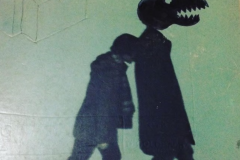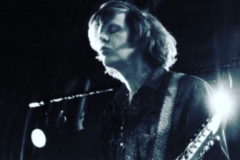J. Robbins is the singer/guitarist held in high regard but many times it’s hushed murmurs and quiet admiration. Many know of the musician that’s performed as part of a number of influential groups like Government Issue, Jawbox, Burning Airlines, Channels, and Office of Future Plans. That’s not to downplay his work that’s run concurrently as a recording engineer and producer in his Baltimore studio, The Magpie Cage.
Robbins has continued to stay active, occasionally recording and releasing music of his own since 2016 (well, that’s not if you count his 2014 Abandoned Mansions acoustic EP, which were reworked versions of Jawbox, Burning Airlines, and Office of Future Plans, along with the title track.)
During that time Robbins has released singles which do appear on his first solo release Un-becoming, recorded between 2016 – 2018. Joining Robbins on 11 of the 12 songs that appear on the album are Peter Moffett (Gov’t Issue/Burning Airlines) on drums, Brooks Harlan (Off. Of Future Plans/War On Women) on bass, and Gordon Withers on cello and guitar. The album drops 5/31 on Dischord Records and today he shares “Soldier On,” the first official single off of the album.
J. Robbins on Un-becoming:
Un-becoming was written and recorded in brief, intense bursts of activity between 2015 – 2018, as my most recent band, Office of Future Plans, was winding to a close. OFP had been born in 2011, from demos for an earlier solo project, but, the thing is … I like bands. The social unit of a band, the creation of a new entity, with its own aura, its own intrigue, out of a collective effort … those things are very appealing to me.
Until very recently, as someone who has always been in collaborative bands, – even if I was the main writer or arranger – the idea of making a “J. Robbins record” made me uncomfortable. And of course once all the members of OFP were working with the material, a collaborative band dynamic naturally emerged, and whatever we were doing together, it didn’t feel right to call it a solo project. However as OFP went on, though it seemed less and less appropriate for me to dictate to the group, writing by jamming wasn’t really clicking either. We had a lot of jams, but no new songs. Concurrently, I started playing more solo shows, and started trying to write songs that would hold up independently of how they were arranged (i.e. the song could still hold on to its essence, its identity, whether a band plays it, or I play it solo guitar and voice, or piano, with electronics, or whatever). I was influenced in this direction by my fandom of the music of John Cale and John Vanderslice, and by production work I had done with some songwriters I knew personally and admired: specifically Andy Bopp, Ryan Patterson of Fotocrime, and Anne Watts of Boister. I mostly kept my guitar in an open tuning, as an attempt to stop myself from trying to be a “clever guitarist” and instead stick to the simplest elements of song structure. These songs ended up feeling much more direct than anything I had ever written before, and I was really excited about them. They also didn’t feel like OFP to me.
The process was really slow, owing to limited time as much as anything else, and I wanted to be able to accommodate that without feeling like I was wasting anyone else’s time or keeping anyone on the hook. All those considerations led me to embrace the idea of a solo record. I knew I could record the songs here at my studio, where I felt at home, but only a day here, a day there, whenever I wasn’t booked to work on other people’s recordings. So, it would be a sporadic thing by necessity. I called up my old friend and former Burning Airlines drummer Pete Moffett to help me record the tunes, since besides being a great drummer and a good friend (who essentially taught me how to play bass when we were in Government Issue together) I always knew him as someone who preferred to fill in an existing song structure rather than jam and see where it would lead. Brooks Harlan was a natural choice to play bass, since he and I have a real musical sympathy – not to mention sharing a studio space. It’s also a very different venue for him since his main outlet is as the guitarist of War on Women – very different musically. My former OFP bandmate Gordon Withers also made great contributions on guitar and cello to about half the songs – although other songs seemed complete without a second guitar. I also enlisted Chris Brooks, keyboard player of Lionize, for one song, and Andrew Grimm of June Star to play pedal steel on another. It was fun, and a new thing for me, to pull in new collaborators in this episodic way. Lyrics-wise, I wasn’t consciously setting out to write an album of protest songs, but as the orchestrated unravelling of society continues, as the cultural commons daily become more and more vicious and absurd, catharsis becomes more necessary, so just about all these songs have that in common.








Social Media